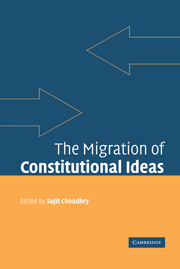Book contents
- Frontmatter
- Contents
- List of contributors
- Acknowledgements
- 1 Migration as a new metaphor in comparative constitutional law
- PART I The methodology of comparativism
- PART II Convergence toward a liberal democratic model?
- PART III Comparative constitutional law, international law and transnational governance
- PART IV Comparative constitutional law in action – constitutionalism post 9/11
- Index
1 - Migration as a new metaphor in comparative constitutional law
Published online by Cambridge University Press: 25 July 2009
- Frontmatter
- Contents
- List of contributors
- Acknowledgements
- 1 Migration as a new metaphor in comparative constitutional law
- PART I The methodology of comparativism
- PART II Convergence toward a liberal democratic model?
- PART III Comparative constitutional law, international law and transnational governance
- PART IV Comparative constitutional law in action – constitutionalism post 9/11
- Index
Summary
The politics of comparative constitutional law
Usually judges ask the questions, but on this night the roles were reversed. The occasion was a public conversation between United States Supreme Court Justices Breyer and Scalia, answering questions posed by constitutional scholar Norman Dorsen. The topic was the ‘Constitutional Relevance of Foreign Court Decisions’ to the Court's constitutional case law. For a court routinely called upon to address the most divisive issues in US public life, judicial citation practices hardly seem worthy of a rare evening with two of its most distinguished members. Yet the auditorium was packed, with hundreds more watching over a live video feed.
Court observers knew that the event merited close attention. The backdrop was the Court's increasing use of comparative and international law – both described as ‘foreign’ to the US constitutional order – in its constitutional decisions over the previous decade. This practice – which I term the migration of constitutional ideas – has deeply divided an already divided Court, along the same ideological lines which have polarized its jurisprudence. Breyer and Scalia are the leading figures in this ongoing jurisprudential drama, although other Justices have joined the debate. Their initial skirmish, in Printz, arose in a challenge to federal attempts to ‘commandeer’ state officials to deliver federal programmes. Breyer suggested that the constitutionality of this practice in European federations was relevant to the Court's analysis, while Scalia, delivering the opinion of the Court, declared ‘comparative analysis inappropriate to the task of interpreting a constitution’.
- Type
- Chapter
- Information
- The Migration of Constitutional Ideas , pp. 1 - 36Publisher: Cambridge University PressPrint publication year: 2007
- 23
- Cited by



